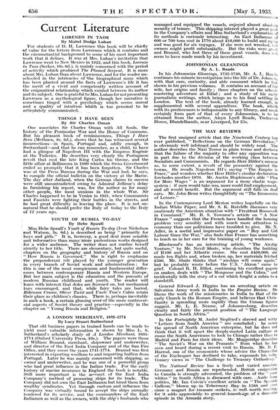THE MAY REVIEWS
The first unsigned article that the Nineteenth Century has ever published, " Reflections on the German -Revolution," is obviously well infolinecl and should be widely read. The author describes the Nazi• Terror in plain terms and declares that the failure of the majority to offer- any opposition was in part due to the division of the working class between Socialists-and Communists.- Ile regards-Herr success as, to some extent, a revolt of the peasantry against the towns. He recalls Napoleon III's saying " The Empire is Peace," and wonders whether Herr Hitler's similar declaration forebodes another 1870. Mr. Austin Hopkinson's able "Plea for More Wages " is an--argument for a More elastic wage- system : if men would take less, more could find employment, and all would benefit. But the argument still falls on deaf ears. Mr. John-Benn writes thoughtfully on-"The Economics of Leisure."
In the Contemporary Lord Meston writes hopefully on the Indian White Paper, and Mr. S. K. Ratcliffe discusses very cautiously the American situation with " President Roosevelt in Command." Mr. B. S. Townroe's article on " A New France " suggests that the French have handled the housing problem very sensibly and with much More attention to economy than our politicians have troubled to give. Mr. N. Adler, in a useful and impressive paper on "Roy and Girl Labour Since the War," also finds that France has something to teach us in her care for the training of young workmen. - Blackwood's has an interesting article, " The Airship Venture," by Mr. Nevil Shute, who describes the building of R100 and her Atlantic cruise. She cost £450,000, she made ten flights and, when broken up, her materials fetched £500. Mr. Shute -thinks that " airships will come again," but he probably wrote before the U.S. Akron' came to grief. Colonel 'R. H. Elliot, continuing his excellent papers on snakes,_ deals with " The Mongoose and the Cobra," and incidentally tells the story of a cat which fought a cobra to a standstill.
General Edward J. Higgins has an arresting article on Salvation Army work in India in the Empire Review. He likens the- work of the missionaries in India to that of the early Church in the Roman Empire, and believes that Chris- tianity is spreading mote rapidly- than the Census figures suggest. Mr. L. E. Neame, of Johannesburg, describes clearly and fairly the present position of " The Language Question in South Africa."
In the Fortnightly M. Andre Siegfried's shrewd and witty " Letters" from South America "- are concluded ; he notes the spread of North American enterprise, but he does not think that it will upset -the deeply-rooted Latin culture or cause the Sciiith Americans to look to Chicago rather than to Madrid and Paris for their ideas: Mr: Muggeridge-describes " The Soviet's War on the Peasants " from what he has seen and heard during a recent- visit to -Russia. Mr. R. F. Harrod, one of the economists whose advice the Chancellor of the Exchequer has- declined to take, -expounds his Mile; tionary views in " The Challenge to Treasury Orthodoxy."
The National Review- has a lively and varied number. Germany and Russia are reprehended,.. British emigration to Canada is strongly advocated, the problem of the " poor whites-" in South Africa is discussed-with care. Aside from politics, Mr. Tan Colvin's- excellent:article on "The Spanish t Galleon,"- blown Tobermory :Bay. in -158,8 and ever since: a magnet for-Areasure --seekers, .is- well. worth-reading, for it adds. appreciably- to generall-knowlc‘ige of . a dramatic episode in the Armada story.










































 Previous page
Previous page